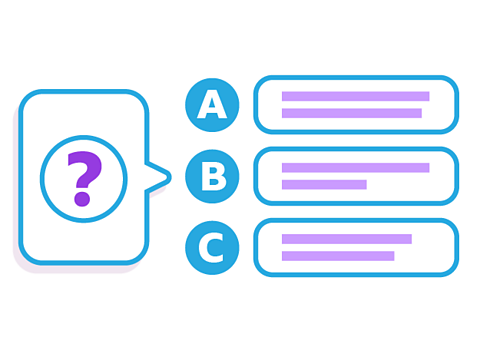Key points about adjectives in Spanish

In Spanish, adjectiveUsed to describe nouns and must agree with the nouns they are describing. are usually placed after the noun they describe.
Adjectives must agreeIn Spanish, an adjective must agree with the noun or nouns they are describing, which means that they have to show if they are masculine or feminine and singular or plural to match the noun. in genderNouns in Spanish are classified into two groups: masculine or feminine. Each noun therefore has a gender. and number with the noun it describes.
Adjectives ending in a consonant follow a different pattern.
Invariable adjectives do not change their ending according to the noun they describe.
Video - Adjectives in Spanish
Watch the video to understand more about using adjectives in Spanish.
An adjective must agree in gender and number with the noun they describe
We use adjectives to describe things.
In Spanish, adjectives usually go after the noun. A tall boy would be un chico alto.
The gender of the adjective also has to agree with the gender of the noun.
Una chica alta because chica is feminine.
In Spanish, adjectives also change depending on how many of something there are.
Gatos is ācatsā. If we use a plural word like gatos, then the adjective needs to be plural too - gatos negros.
'One' or 'a' red jacket would be una chaqueta roja but five red jackets would be cinco chaquetas rojas.
If you were talking about a video game, un videojuego, and you wanted to say it was fun, divertido, youād say un videojuego divertido - a fun video game.
But, if you wanted to say 'two fun video games', youād say dos videojuegos divertidos.
All the endings are plural and the right gender.
When you're thinking about what adjectives to use, the key is that they have to agree with what theyāre describing.
Agreement of adjectives in Spanish
In Spanish, adjectives must agree with the nouns they are describing, which means that they have to show if they are masculineIn Spanish, all nouns have a gender, either masculine or feminine. or feminineIn Spanish, all nouns have a gender and are either masculine or feminine. (known as the gender) and singularRefers to only one object or person. or pluralMore than one of an item. to match the noun.
Find out more about the gender of nouns in Spanish grammar.
How to make adjectives agree
When you look up an adjective in the dictionary, it is always in the masculine singular form.
For example:
Sorry, something went wrongCheck your connection, refresh the page and try again. - white
Sorry, something went wrongCheck your connection, refresh the page and try again. - new
Adjectives in Spanish usually follow the patterns in the table below to agree with the noun they are describing.
| Adjectives ending in: | Masculine singular | Feminine singular | Masculine plural | Feminine plural |
|---|---|---|---|---|
| o/a | Sorry, something went wrongCheck your connection, refresh the page and try again. | Sorry, something went wrongCheck your connection, refresh the page and try again. | Sorry, something went wrongCheck your connection, refresh the page and try again. | Sorry, something went wrongCheck your connection, refresh the page and try again. |
| e | Sorry, something went wrongCheck your connection, refresh the page and try again. | Sorry, something went wrongCheck your connection, refresh the page and try again. | Sorry, something went wrongCheck your connection, refresh the page and try again. | Sorry, something went wrongCheck your connection, refresh the page and try again. |
| or/ora | Sorry, something went wrongCheck your connection, refresh the page and try again. | Sorry, something went wrongCheck your connection, refresh the page and try again. | Sorry, something went wrongCheck your connection, refresh the page and try again. | Sorry, something went wrongCheck your connection, refresh the page and try again. |
| a consonant | Sorry, something went wrongCheck your connection, refresh the page and try again. | Sorry, something went wrongCheck your connection, refresh the page and try again. | Sorry, something went wrongCheck your connection, refresh the page and try again. | Sorry, something went wrongCheck your connection, refresh the page and try again. |
For example:
Sorry, something went wrongCheck your connection, refresh the page and try again. - a small house
Sorry, something went wrongCheck your connection, refresh the page and try again. - a blue car
Adjectival agreement - Mini quiz

Fill in the blank with the correct form of the adjective to translate the sentence:
My friends are intelligent.
Mis amigos son _______
Mis amigos son inteligentes.
Amigos is masculine and plural and inteligente in the singular ends in e.
Add s to make the adjective agree with the noun.
Adjectives of nationality ending in a consonant
Some adjectives of nationality end in a consonant.
For example:
Sorry, something went wrongCheck your connection, refresh the page and try again. - Scottish
Sorry, something went wrongCheck your connection, refresh the page and try again. - Spanish
Sorry, something went wrongCheck your connection, refresh the page and try again. - German
These adjectives follow a slightly different pattern:
| Adjective ending | Masculine singular | Feminine singular | Masculine plural | Feminine plural |
|---|---|---|---|---|
| s | Sorry, something went wrongCheck your connection, refresh the page and try again. | Sorry, something went wrongCheck your connection, refresh the page and try again. | Sorry, something went wrongCheck your connection, refresh the page and try again. | Sorry, something went wrongCheck your connection, refresh the page and try again. |
| l | Sorry, something went wrongCheck your connection, refresh the page and try again. | Sorry, something went wrongCheck your connection, refresh the page and try again. | Sorry, something went wrongCheck your connection, refresh the page and try again. | Sorry, something went wrongCheck your connection, refresh the page and try again. |
| n | Sorry, something went wrongCheck your connection, refresh the page and try again. | Sorry, something went wrongCheck your connection, refresh the page and try again. | Sorry, something went wrongCheck your connection, refresh the page and try again. | Sorry, something went wrongCheck your connection, refresh the page and try again. |
Notice what happens when ±š²õ³¦“Ē³¦Ć©²õ and ²¹±ō±š³¾Ć”²Ō are not in the masculine singular ā the accent on the e and a is dropped.

Remember
Adjectives of nationality in Spanish do not start with a capital letter.
Invariable adjectives
Some adjectives donāt change their endings at all.
For example:
Sorry, something went wrongCheck your connection, refresh the page and try again. - pink
Sorry, something went wrongCheck your connection, refresh the page and try again. - orange
Sorry, something went wrongCheck your connection, refresh the page and try again. - each
These are known as invariable adjectives.
Quiz - Adjectives in Spanish
Practise what you've learned about adjectives and adjectival agreements with this quiz.
Video - Explore more about adjectives in Spanish
Watch the video for more information about adjectives in Spanish.
Adjectives must agree in gender and number with the noun it describes
Ugly pets, evil babies.
Just some of the things you might want to describe in Spanish. But to do so, you need to know how adjectives work!
Adjectives are words used to describe nouns.
āDogā in Spanish is a masculine noun - un perro.
Say you want to describe a dog. Well, the noun is masculine so the adjective needs to be masculine too ā they need to agree.
If your dog does this, you would say mi perro es tonto.
In this case, the adjective ends in an o.
In Spanish, the adjective usually comes after the noun. To describe a house - una casa - which is feminine, the adjective has to be feminine too. In this case it has to end in an a. Una casa blanca.
But wait a minute!
Some masculine adjectives end in an e. What then?
Fuerte. Inteligente. Grande.
Not a problem. They just stay the same for the masculine and feminine.
Un perro grande. Una tarte grande.
What about adjectives which end in a consonant?
Take feliz - happy. Ahhh, hereās a happy cat. Un gato feliz.
The ending of feliz doesnāt change, whether youāre talking about a cat which is masculine, or a frog, which is feminine - una rana.
Adjectives ending in a consonant donāt change regardless of gender.
Tengo una hermana difĆcil. I have a difficult sister.
That doesnāt change either, even though 'sister' is most definitely feminine.
What if youāve got two sisters and theyāre both difficult? You need to make adjectives plural to describe plural nouns.
If the adjective ends in a consonant, just add es.
And if the adjective ends in o, a or e, just add an s to make it plural.
Got more than one oversized dog?
You go from un perro grande to dos perros grandes.
But be careful if you are using adjectives to describe nationality such as āEnglishā and āSpanishā, ¾±²Ō²µ±ōĆ©²õ and ±š²õ±č²¹Ć±“Ē±ō which end in consonants when masculine. These behave a little differently in the feminine form.
±õ³Łās el desayuno ¾±²Ō²µ±ōĆ©²õā¦ but la comida inglesa.
So, there you have it.
Now get out there and start describing crazy stuff!
Now you have learned about adjectives in Spanish why not explore adverbs in Spanish?
More on Adjectives and adverbs
Find out more by working through a topic
- count2 of 8

- count3 of 8

- count4 of 8

- count5 of 8
